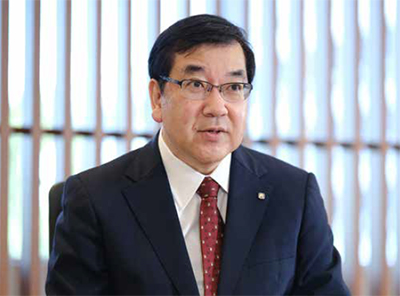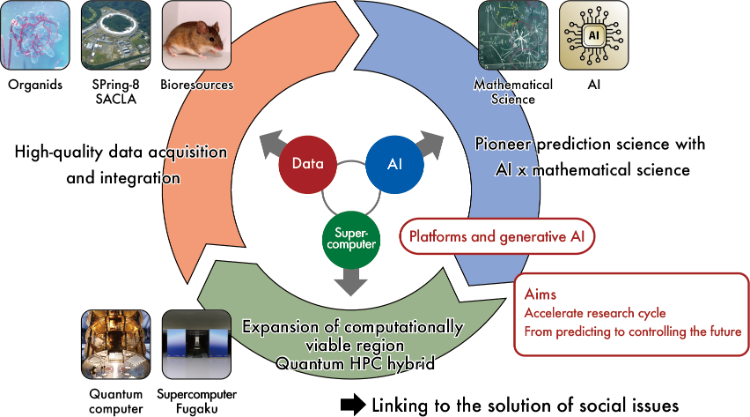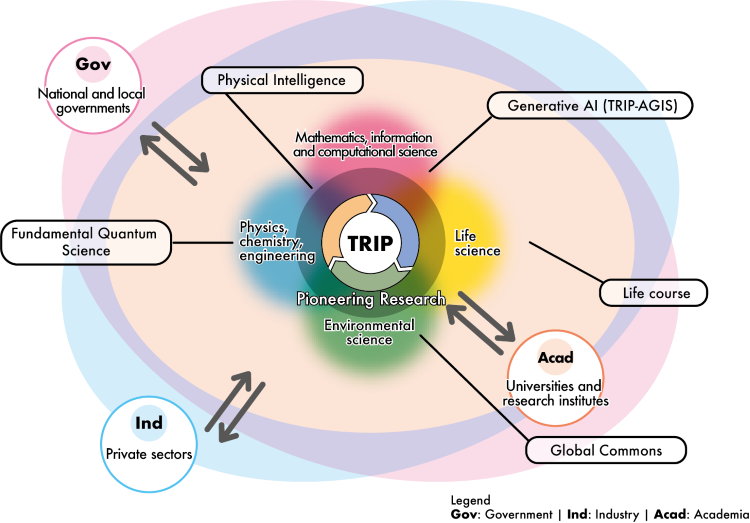
RIKEN is home to outstanding researchers in a broad range of fields of fundamental science and a rich array of research platforms. RIKEN President Makoto Gonokami has proposed the concept of "Transformative Research Innovation Platform of RIKEN platforms" (TRIP), which aims to organically link these assets to create new knowledge and pave the way for a better future. In the midst of rapid changes in the industrial structure and mounting global environmental challenges, as well as dramatic advances in AI, quantum computing, and semiconductor technology, RIKEN is working to fully leverage its strengths to generate new wisdom for solving social issues and bringing about social change.
TRIP, a concept of "Science that Connects," drives collaboration and a fusion of different fields
― What is your perception of the current situation that led to the concept of TRIP?
After taking office in April 2022, I spent a month or two traveling around RIKEN's research sites. I was impressed by the extremely high level of research. Individual researchers were confident and proud of their own research, and they were enjoying their work. On the other hand, I felt that although there was a lot of excellent research being carried out, the connections between researchers could be stronger.
Beginning with its founding in 1917, RIKEN has consistently created new knowledge with the potential to transform the industrial structure. It has endeavored to create new scientific fields by going beyond existing areas. This is the foundation of the RIKEN Spirit, and indeed it is RIKEN's mission to create new wisdom through collaboration. Given that, the lack of connections seemed unfortunate. However, simply saying "why not collaborate" is not enough to get things moving.
Since around 2015, there have been rapid developments in the area of AI, especially in deep learning, and it has become imperative in different fields to maintain the data needed for this development. We thought that by focusing on a vision of advanced utilization of "data," we could effectively promote collaboration across fields.
This led to the concept of TRIP for promoting a "science that connects." (Figure 1).

Figure 1. The TRIP Concept
― How exactly will the concept of connecting proceed?
RIKEN's state-of-the-art research platforms are very important in terms of promoting cross-disciplinary collaboration.
Fugaku, which is one of these platforms, is a very successful supercomputer from an international perspective. Compared to its predecessor the K computer, which was largely seen as a tool for trained specialists, Fugaku has created an environment that facilitates the use of applications that were developed in a variety of situations. This led to a rapid expansion of the user base and, in a sense, the rapid "democratization" of the supercomputer. The introduction of advanced scientific computing and AI technologies has made it possible to perform calculations that were previously out of reach.
In addition to allowing future forecasting that can be applied to huge and complex systems such as the weather, it is also demonstrating its power in various academic fields such as mathematics, physics, life science, and materials science. We are also working on the development of quantum computers that can perform calculations that are not possible with classical supercomputers, and have reached the point where we can open them up to the outside world via the Cloud. Current quantum computers are still evolving, but by linking them with supercomputers, we are beginning to see the possibility of performing calculations that could not be done with supercomputers alone. RIKEN is now leading the world in the full-scale development of such hybrid computation techniques. We expect that this will dramatically accelerate the development of new materials and drugs, weather forecasting, and many other types of research.
The TRIP initiative is an ambitious effort to transform scientific research through the use of data. This is premised, of course, on the availability of advanced data in a variety of areas. Some sources of such data include the SPring-8 synchrotron radiation facility, the BioResource Research Center, which is a repository of life science resources, and imaging technology, which plays an active role in various aspects of life science. RIKEN possesses all of these elements at an advanced level, allowing the cycle shown in Figure 1 to be effectively implemented.
In the conduct of research, the pursuit of the leading-edge tends to leave to a fragmentation into specialized fields. However, the top runners understand that the real thrill of research is the fusion of cutting-edge research to create new disciplines. Our strength lies in the fact that it has a concrete structure for this purpose and can actually put it into action.
As an example of the "Science that Cennect" initiative under the TRIP initiative, a project (TRIP-AGIS) has been launched to accelerate scientific research using generative AI. This project aims not only to make use of AI, but also to clarify the challenges facing and the effectiveness of AI through the development and sharing of AI infrastructure models for scientific research, and to utilize science for the advancement of AI in a bidirectional manner. We are trying to simultaneously carry out "AI for Science" and "Science for AI."
― RIKEN has many researchers in the life sciences, and some of your research extends into the humanities and social sciences. How has the TRIP concept been received by researchers there?
It is true that the majority of RIKEN researchers are in the life sciences. When I explained the TRIP concept to our international advisory council, one of the members asked, "Will life science researchers be willing to follow such a math-oriented idea?" However, I have found that a surprisingly large number of researchers question the vertical division of academic principles and would like to be able to freely use a wide range of knowledge.
Life science deals with very complex systems, so there is a strong desire to utilize AI, which is seen as a very powerful tool. In Japan, there are many mathematically gifted researchers, some who have competed in the International Mathematical Olympiad when they were high school students, and they are capable of independent statistical analysis and program development. If researchers like these could team up with cutting-edge AI researchers, they would certainly be able to produce even more amazing results. I think it is important to connect researchers across disciplines, allowing them to work together on things that they did independently before due to the lack of opportunities for connections.
I expect that this will encourage a greater fusion of the natural sciences with the humanities and social sciences. Efforts to integrate the humanities and social sciences were underway since before I took office, and I believe that this concept will continue to move forward.
The "science that connects" that we are promoting under TRIP should not force researchers to go in a certain direction, nor should it forcibly channel research into a limited field. The most important driving force for excellence in research is researchers' own spirit of inquiry, so TRIP must be a neutral mechanism that does not inhibit that spirit. I think I could share the idea with most researchers, because it is a concept that came to me without any discomfort given my own actual experience as a researcher in physics.
RIKEN as a global research hub
― Collaborations and exchanges with overseas companies and research institutions are becoming increasingly active. How do you see RIKEN's presence in the world?
During the two and a half years since I became President, we have concluded a basic agreement for mutual cooperation with Intel, a major U.S. semiconductor company, and Argonne National Laboratory, which is home to the supercomputer Aurora, and have also signed memorandums of understanding for collaboration and cooperation with imec, a Belgian non-profit research institute, the Quantum Initiative at Harvard University, and others. In addition, we have been promoting exchanges with IBM's semiconductor research base and TSMC, which recently established a production base in Kumamoto, Japan.
One area of particular focus for our international collaboration is quantum technology. Not long ago, quantum computers were a dream technology that seemed several decades away, but we have made rapid progress, to the point where we are now competing to see how they can be used for specific calculations. In the midst of all this, there are issues that remain unresolved regarding the fundamental principles of what quantum is.
I believe that now is the time to do research that goes back to the foundations of quantum science. Considering this, we have launched a program in basic quantum science, with the goal to enhance the nurturing of research personnel by forming a world-class research center and hub for brain circulation in the field of basic quantum science. To this end, we are considering a further expansion of our collaboration with Brookhaven National Laboratory in the US, an institute with which we have had a strong partnership for more than a quarter century. In particular, we hope to be able to do research using the US's Electron Ion Collider (EIC) project. With the Harvard Quantum Initiative, we are moving toward doing more basic quantum science together. Along with these efforts, we are also planning to create a structure in which RIKEN can play a central role in pioneering the new "fundamental quantum science research" that will contribute to the development of new academic fields and new technologies, in areas such as "multiscale quantum dynamics research" that will allow us to elucidate the universal laws of quantum dynamics that underlie matter, life, and the universe, by expanding the circle of collaboration with researchers at universities in Japan and overseas.
What I sense through these exchanges is that there are high expectations toward RIKEN around the world. There is no doubt that RIKEN has a value that makes us an attractive potential partner for the world's top research institutions. I believe that they collaborate with us because they have the expectation that research with RIKEN will expand their opportunities for discovering new wisdom. I also believe that RIKEN researchers can rediscover their own value and strengths by working with top researchers around the world.
I do believe we can do more to let people in Japan know that we are held in such high esteem around the world, so I would like to clearly communicate RIKEN's activities and vision, as this will encourage young people who will lead the next generation.
Responding to changes in future society
― What plans do you have for the future?
In addition to the Fundamental Quantum Science Research that I mentioned earlier, we are considering a number of interdisciplinary research programs based on the TRIP platform.
We are currently conceiving a project that will focus on Physical Intelligence. In recent years, generative AI has spread widely and has developed at an astonishing rate. Currently, generative AI works through a mechanism where a question is asked to a large-scale trained foundation model, and a response is generated based on inference calculations. Currently, these inference calculations are performed on Cloud servers, and naturally the number of calculations increases along with the number of users. Reducing the power consumption of these inference calculations is a critical challenge. This is an important target for cutting-edge semiconductors which are the focus of investments around the world.
As chips become more advanced, it will be possible to connect them to the Cloud via next-generation wireless technology so that inference calculations can be performed not in the Cloud but on the end device. This could lead to a world in which we are surrounded by robots and self-driving cars that freely use generative AI. This represents an advance in the area of robotics, where various machines are connected through generative AI. It might allow us to automate labor-intensive tasks such as cell collection and the culturing of experimental plants. It could also lead to innovations in production technology and revolutionary energy-saving technology, such as the automation of drug discovery experiments and the complete automation of semiconductor manufacturing, including post-processing. We hope to build up the academic science necessary to realize this dream, and want to leverage RIKEN's strengths in this area.
We have also decided to carry out international collaboration on the Global Commons. The Global Commons refers to the shared resources of humankind, including the global environment, ecosystems, and natural resources, and the project is aimed at pursuing scientific principles for the conservation of the global system.
RIKEN has a rich store of the fundamental science that is necessary for sustaining the global environment, including in areas such as plant science and bioresources. However, I feel that researchers are sometimes unaware that they are making important findings that could help protect the Global Commons. This is unfortunate. If there are researchers in this position around the world, RIKEN could take the lead in showing that their findings are useful, and this could change the perspective of researchers around the world. In Japan, RIKEN has already begun collaborating with the University of Tokyo Center for Global Commons (CGC) to begin joint research to explore solutions for maintaining the Global Commons. Further, I was able to have a dialogue with Dr. Johan Rockström, Director of the Potsdam Institute for Climate Impact Research (PIK) in Germany and a world-renowned researcher who proposed the concept of "planetary boundaries", and he expressed great interest in co-creation with RIKEN. Protecting the Earth system is a difficult task that requires new wisdom, but it also provides a treasure trove of new themes for cutting-edge research.
In addition, though it is still in preparatory stage, we are conceiving a project in the life sciences which is meant to lead to an understanding of life as a whole, including the human.
Until now, life science research has tended to be carried out based on studies of model organisms. For the past seven years, RIKEN has been conducting research aimed at linking our findings to the understanding of the human, and using this knowledge for therapies and drug discovery. Our program for "science across the life course" is a further step in this direction. We want to consider the human being along the whole "life course," adding sociological analysis to the series of life processes from reproduction, development, and regeneration to aging. Beyond that, we would also like to gain an understanding of society, which is composed of connections between people.
This may go beyond the boundaries of conventional natural sciences. I believe that RIKEN, which pursues a wide range of scientific research, is perfectly placed to take on this challenge. Eliminating the distinction between natural science and humanities may be a natural path for the science of the future. The day may not be so distant when a Nobel Prize will be given in such an area.

Figure 2. "Science that Connects" using TRIP contributes to a better future
RIKEN will embark upon its next seven-year medium- to long-term plan in FY2025. In order to further advance the current concepts and plans throughout RIKEN, we are simultaneously implementing organizational reforms to facilitate horizontal linkages, utilizing the "science that connects" initiative based on the TRIP concept to prevent the creation of "silos" within the organization (Figure 2).
Learning is not bound by time, but is multi-scale, whether we are thinking about the creation of the universe 13.8 billion years ago, predicting the future, or focusing on phenomena as short as a billionth of a second. The activity of creating new wisdom is very exciting for researchers. We hope to utilize the knowledge we have gathered in this way to create value by introducing new perspectives in collaboration with universities, research institutes, and other organizations in Japan and overseas.






